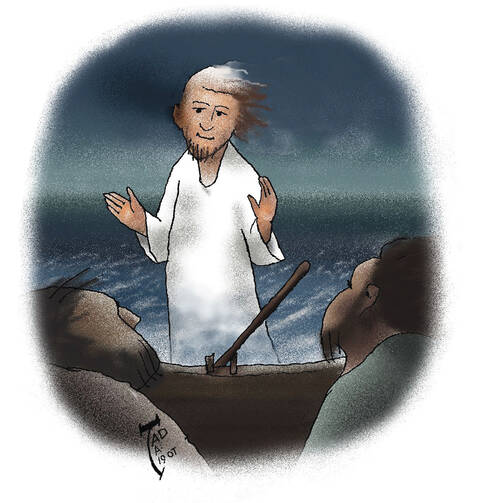Holy Ghost Story
If you examine older English translations of the Bible, like the Douay-Rheims or the King James Version, a quick search offers you more than 100 instances of the word ghost in each version. Most often these Bibles are translating the Greek phrase hagios pneuma as “Holy Ghost,” while current translations always render it as “Holy Spirit.” The word ghost in modern versions generally translates the Greek word phantasma, found in the Gospel passages relating to Jesus walking on the water, as in Mt 14:26. When you look at this verse in the Douay-Rheims and the King James versions, neither of them has “ghost,” but “apparition” and “spirit,” respectively.
Much of this has to do with how the meaning of words changes from generation to generation. Raised as much of my generation was on a steady diet of cartoon ghosts, ghost stories and Halloween costumes made out of bed sheets, the phrase “Holy Ghost” no longer carried a connotation of holiness or the spiritual. But neither did the specter of fear necessarily attach itself to the word ghost. However one translates phantasma, whether as ghost, apparition or spirit, it is clear that this word did not point to a normal bodily entity for the apostles, and the thought of this phantasma walking toward them on the water created terror among them. For, “when the disciples saw him walking on the sea they were terrified. ‘It is a ghost,’ they said, and they cried out in fear.”
The presence of the unknown or the strange truly does create fear, with which the apostles struggled as do most of us, but in this encounter Jesus intended to reveal something of his divinity to his disciples. It is not primarily Jesus’ miraculous walking on the water that is revelatory, though it does reveal God’s authority over nature. The deeper revelation is in Jesus’ words to the fearful apostles: “Take courage, it is I; do not be afraid.” The Greek phrase translated “It is I” is egô eimi, “I am,” which was an expression of self-identification for God in the Old Testament, as in Ex 3:14, where God said to Moses, “I am who I am.” Jesus attempts to calm their fear by identifying God’s presence in the midst of the storm and, even more acutely, God’s presence in Jesus’ own being. God is with them in the flesh.
Peter appears to accept Jesus’ command at face value and trusts that it is not a phantasma but Jesus who has called out to them. Peter began to walk on the water, but fear arose once again when the windstorm became stronger and Peter’s resolve wavered. Yet even as Peter began to sink in the waves, a consequence, says Jesus, of “little faith” or doubt, Peter retained in his little faith the wherewithal to call out to Jesus: “Lord, save me!” It is an interesting mix of doubt, which leads him to sink, and residual faith, which allows him to seek salvation in the midst of his sinking. Not just Peter, but all those who were in the boat and witnessed these events “did him homage,” a word evoking worship, and they called Jesus “the Son of God.” Jesus has revealed power over nature and the forces of chaos; but even more important, he has revealed his divine nature and the ability to save when all seems lost.
Most of us have not experienced God’s divine presence as profoundly as the apostles, and they were overcome by doubt and fear. They feared that their senses were deceiving them and that what they were witnessing was just a terrifying ghost. And yet this is where the ghost story becomes most interesting. God does not always come to us in the flesh, or in the storm, or in chaos. God is revealed in numerous ways. Elijah came to a cave on Mount Horeb, the mountain of God, to encounter God, but God was not present in the windstorm, or the earthquake, or the fire, but in “a tiny whispering sound.” After Elijah heard this sound, he “went and stood at the entrance of the cave” to be attentive to God’s presence. It was in the calm after the storm that God was revealed in the quietness. The spirit of God came to Elijah in a spiritual, one might even say a ghostly manner.
This article also appeared in print, under the headline “Holy Ghost Story,” in the August 4-11, 2014, issue.








